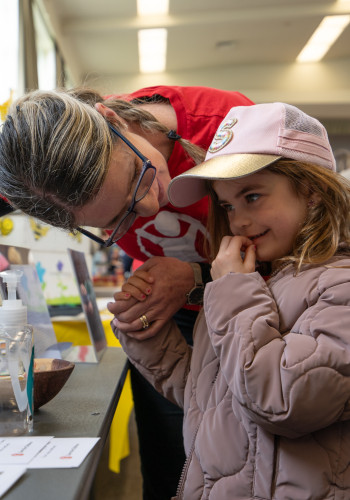Jacqui Southey: What Kiwi kids want in 2024
OPINION: As we head towards the potential and promise of a new year, we encourage a new year resolution we believe will create the greatest change: to listen to our children, and put their aspirations into action.

Save the Children Advocacy Director Jacqui Southey shows her granddaughter a children's voting booth.
Kiwi kids spoke loud and clear in this year’s ‘children’s elections’, where more than 1000 of them shared their views on issues that were important to them, the sort of prime minister they wanted to lead Aotearoa, and their ideas for how we can make New Zealand a better place for all New Zealanders.
Children care deeply about others. They want people to have access to nutritious food, healthy housing and to see an end to poverty and inequality. They are concerned about the cost of living, crime and safety. They have much to say about education, wanting it to be improved, and also wanting greater balance in their lives with more time for family and play. They care about recreation, particularly sports, playgrounds, libraries, pools and community events.
Children asked for a kind prime minister who cares about nature and the environment, and one who considers the voices of children when making decisions that impact them. As 11-year-old Ryo put it, “a prime minister who loves children”.
While children may not yet be old enough to vote, their voices matter. Their lives will be impacted by the decisions our politicians make, today and for many years to come. Ensuring their voices are heard is not only good practice, but is a fundamental right under Article 12 of the United Nations Convention on the Rights of the Child. Upholding the Convention is a promise New Zealand made to children more than 30 years ago.
Throughout Aotearoa’s history, children and young people have been leading the charge for positive change. And yet, despite their efforts, their clear understanding of the issues impacting them, and the need for greater action on the cascading crises that Aotearoa’s young are facing and will face, their voices are not translating into policy solutions.
Children are citizens in their own right. They are unique beings with important ideas, experiences, talents and insights. Individuals like our youth ambassador Lola, 15, who stood on the steps of Parliament alongside her peers in August, demanding politicians take greater action in the face of climate change. “History will remember the choices you make,” she said. "We will remember the choices you make.”
Children care about the big issues. They want to be involved more in decision-making. Like 10-year- old Jemma, they want to be consulted about issues that impact them, and for adults to listen to them. “Our decision-makers should listen to us more, our imaginations can be very creative so adults should use more of our ideas,” she says, while Shaz, also 10, offers the reason why their voices should be considered: “Because we all need to work together on challenges that children are confronted with.”
Children can and do make a difference. They have led the climate change conversation here and around the world, achieving much along the way. This year, in a major win for child campaigners, the UN’s Committee of the Convention of the Rights of the Child recognised children’s right to a clean, healthy and sustainable environment. This means governments, including New Zealand’s, will need to recognise that inaction on the climate crisis is a child rights violation.
Here at home, children have been adamant they want our leaders to care about the natural environment and the future of our planet. Earlier this year, in our Messages in a Bottle campaign, more than 200 children submitted messages to leaders calling for urgent climate action.
Children are also very aware of the rising cost of living and the burden on families who are already struggling. Children as young as eight want the Government to address the cost of food and housing, to pay their parents and families more, and to ensure people are not living in poverty.
“Bring down the cost of houses and food so that kids have a warm home and don't get hungry,” says 10-year-old Lilly, and “make houses for children and for homeless people,” says 10-year-old John.
Too many children in New Zealand are still experiencing enduring levels of poverty, particularly for groups of children including Māori, Pasifika and disabled children. Too many children are shut out from affordable, healthy homes, while their families' too-low incomes struggle to afford the basics.
Too many struggle to access equitable healthcare when they are sick. Too many live in homes with not enough food. Too many miss out on the childhood we all wish for our children.
To be a prosperous nation, we need all our families to thrive.
We urge all elected politicians to genuinely listen to children, to consider their views and make the decisions we need to tackle the many and enduring issues that children face.
There’s a lot for all of us to do, but 2024 brings a leap year filled with promise and potential. It’s time for us to realise the rights of the 1.2 million young people who want New Zealand to be a place where "our parents get paid enough” and there is “more kindness and caring for children as much as … for other people.”
A hope. A new year. A resolution. A future.

